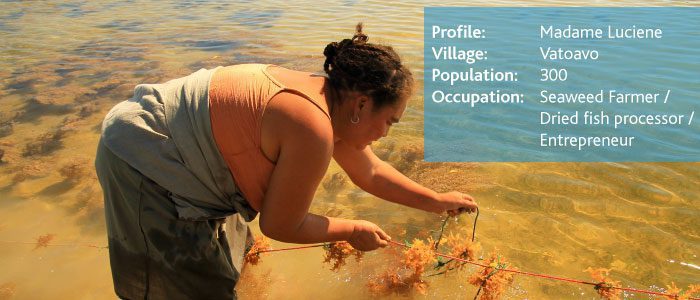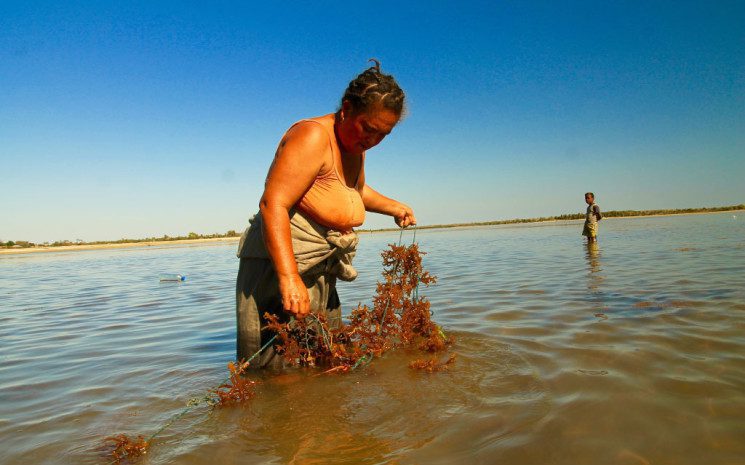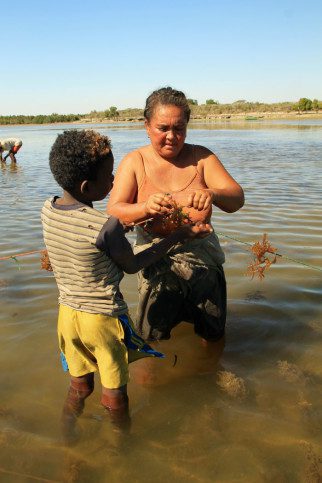The livelihoods and cultural identity of Vezo people in southwest Madagascar are intimately intertwined with the marine environment. Vezo livelihoods, however, are increasingly threatened by overfishing and mangrove deforestation, largely driven by demand from outside markets. Climate change is also having an impact, creating inconsistent wind patterns and rough seas too dangerous for fishing. Blue Ventures has been working with partners to pioneer viable alternatives to fishing to support alternative livelihoods, alleviating pressure on fisheries while gaining a new source of sustainable income through lomotse (seaweed) and zanga (sea cucumber) farming.
This series of aquaculture profiles, written by Angelina Skowronski, explores the opportunities for livelihood diversification and capacity building through the eyes and words of Vezo fishers themselves.

Madame Luciene sits inside her home. She’s surrounded by sacks of vary (rice), raw coffee beans, and tsako (dried corn kernels). Outside, her bamboo mats are filled with fish and shrimp drying in the heat.
Madame Luciene considers herself a businesswoman. She buys fía (fish) and tsitsike (shrimp) from local fishermen, salts it, dries it and resells it to a vendor in Tampolove. She runs a small café and shop for the community where she sells coffee, tea, and pastries like bokoboko (fried doughballs) and mokary (mini pancakes), and the staples like vary.
When she’s not managing her small business, she walks out into the shallows of the Bay of Assassins and manages her lomotse (seaweed) lines. To be a successful businesswoman, Madame Luciene says she must understand her market.
“I know everything about the lomotse business. How many kilos on a string, how long it will take to regenerate and how long it will take to dry,” she says.
With as many projects as Madame Luciene has, it’s evident that she’s not only a businesswoman, but also an entrepreneur. But being an entrepreneur comes with risks.
 “I used to always have debts,” Madame Luciene says with a matter-of-fact tone. “I would always have to ask for advances from the fíantsira (salted fish) and tsitsike maiky (dried shrimp) buyers.”
“I used to always have debts,” Madame Luciene says with a matter-of-fact tone. “I would always have to ask for advances from the fíantsira (salted fish) and tsitsike maiky (dried shrimp) buyers.”
The cycle of debt was not sustainable, and though the shop and fish business might have seemed prosperous to her neighbours, she was living advance-to-advance, or in this case, debt-to-debt.
“When I started farming lomotse, I no longer acquired debt or had to ask for advances. I was able to save,” says Madame Luciene. “Now when the children start the school year, we can afford to send them ourselves, and still have some left over for emergencies in case one of us gets sick. We never had this before.”
Madame Luciene herself received schooling only until middle school, but she’s determined to put all six of her children through high school in Morombe.
According to UNICEF’s most recently available statistics (2013), 79% of Madagascar’s youth are enrolled in primary school, but only 40% of those complete primary school, leading to low literacy rates of around 65%. These national figures mask a much harsher reality in isolated rural areas such as Velondriake, where adequately staffed and resourced public schools are a rarity.
Madame Luciene’s village of Vatoavo only has a primary school, so if parents want their kids to continue education, they must send them to Morombe, a two-day journey consisting of a pirogue sail, a 16-kilometre walk, and a taxi-brousse (bush taxi) ride.
 “When the children are back on holiday from school, they help out on the lomotse farm to cover their school fees,” she stresses.
“When the children are back on holiday from school, they help out on the lomotse farm to cover their school fees,” she stresses.
As the businesswoman and entrepreneur in the family, Madame Luciene handles all of the financial decisions relating to her various businesses and her family.
My husband usually goes to Tampolove to sell the fíantsira, tsitsike maiky, and lomotse. When he gets home he hands me the money and says ‘you know what to do with it,’” she says with a self-assured smile. “I know how to make more money out of a little money, and my husband recognises that.”
Being the holder of the purse strings means she’s also looking after the future of her family. “My daughter just graduated from high school in Morombe, but she can’t continue to university because we can’t afford to send her. I want to continue lomotse farming because it’s our safety net. I want to be able to send my other children to university.”
This is the sixth and final post in a series of aquaculture profiles, written and photographed by Angelina Skowronski, which explore the opportunities for livelihood diversification and capacity building through the eyes and words of Vezo fishers themselves.
You can find out more about our aquaculture work on our website. We would like to thank our partners for their commitment and expertise without which such projects would not be possible.

